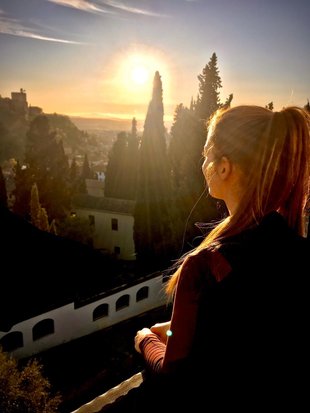Lindsey: "The knowledge of my BRCA2 gene mutation is a gift; it could save my life"
Despite having no known family history of cancer, Lindsey decided to take part in the NHS Jewish BRCA Testing Programme as one of her grandparents was Jewish. She was shocked when she found out she does indeed carry a faulty BRCA gene. She tells us her story here.

Lindsey talks us through her genetic testing experience.
"I’m in the unique position where I have the privilege of working as specialist breast care nurse in the NHS and have recently just been diagnosed with the BRCA2 gene mutation myself. Due to my job, I have been aware of the gene mutations linked to breast and ovarian cancer, such as BRCA1 and BRCA2, for many years. I’m no stranger to what they mean and the implications they have for the individuals that are found to have them.
The story of how I found out I have the BRCA2 gene mutation at the age of 35 however, is somewhat different to the vast majority of stories out there, which is why I feel it’s so important for me to share.
Unlike so many people with a BRCA gene mutation, there is no history of breast or ovarian cancer on either side of my family and, thankfully, I have never had a cancer diagnosis myself. Normally, there is quite a specific set of criteria to get tested for the BRCA gene mutations on the NHS. Most people are only eligible for genetic testing, for example, due to a strong family history of cancer, having a close family member with a known BRCA gene mutation or having personally developed certain types of breast and ovarian cancers themselves. However, none of these applied to me.
So how and why did I get tested on the NHS?
My story starts about a year ago when I learned that I could apply for my Czech citizenship and passport through my mum’s Czech ancestry. My mum was born in the Czech Republic to her Czech father and English mother. I have always known that my Czech grandfather was Jewish and through my work as a breast care nurse I was also aware that people with Ashkenazi Jewish heritage have around a 1 in 40 chance of having a BRCA mutation compared to about a 1 in 400 chance in the average population in the UK. In the back of my mind, I started to think “what if I have a BRCA gene mutation?” but I quickly dismissed this because, like I said, there’s no family history and I wouldn’t be eligible for any BRCA testing on the NHS anyway.
One day, however, when I was googling things about Jewish ancestry for my citizenship application, the Jewish BRCA testing programme website popped up. The page led me to the NHS Jewish BRCA testing page and I was really surprised to learn that the NHS was offering BRCA testing to anyone over the age of 18 in England with at least one Jewish grandparent, irrespective of any personal or family history of cancer.

"I don’t know why but something inside me said “You need to do this.” - Lindsey
I applied online through the website and received my saliva testing kit and consent form through the post around 8 weeks later. It was very easy and painless and just involved spitting into a plastic tube and filling out a few forms. I’ll be honest and admit that I deliberated over whether I should actually do the test or not for several weeks but the nagging question over whether or not I could be one of the “1 in 40” persuaded me do it. So off I went to the post office and sent it all off in the prepaid envelope, fully expecting the results to come back negative.
On 21st August 2023, 10 weeks after sending my test kit off, I came home from work to a letter from the Royal Marsden Hospital. I thought it must be the negative BRCA results but as I read through the letter I couldn’t have been more wrong.
Result: Gene fault (mutation) found in BRCA2.
It took a while for me to realise what it actually said. My heart began to race, I knew what this meant, and I knew my life had changed forever in that moment. I was completely shocked if I’m honest; I had not expected this result at all. It sounds ridiculous because, even though I knew that statistically I was an increased risk, I just didn’t think the test was going to show a BRCA gene mutation. Even I, as a specialist breast care nurse, was under the impression that there definitely would have been at least one case of breast or ovarian cancer in the family for me to have a BRCA mutation. I was wrong.
A few weeks after receiving the letter I had a telephone consultation with a lovely genetic counsellor from the Jewish BRCA testing Programme at the Royal Marsden and they referred me on to my local clinical genetics service. I later found out that my mum had two paternal uncles and two paternal cousins that all died of pancreatic cancer. Both the BRCA1 and BRCA2 gene mutations can increase the risk of pancreatic cancer, more so in BRCA2, so perhaps my family history is pancreatic cancer and not the typical breast or ovarian.
My mum and my older sister also decided to get tested through the Jewish BRCA testing programme following my positive result and, sadly, both tested positive for the BRCA2 gene mutation.
My wider family have also been informed and they can opt to have BRCA testing too if they wish.
The average lifetime risk of a woman developing breast cancer in the UK is around 14% and the average lifetime risk of ovarian cancer is 2%. Following my appointment with the regional genetics service, I learned that, currently, my risk of developing breast cancer in my lifetime is around 77% and my risk of developing ovarian cancer is 17%. With these odds, although it’s important to say they are only statistics and I may never go on to develop either of these cancers in my lifetime, there’s no doubt in my mind that I want to have risk-reducing breast and ovarian surgeries.
I’ve always believed that knowledge is power and prevention is always better than the cure.
I’m currently in the process of planning my upcoming risk reducing bilateral mastectomy with immediate reconstruction and I will go on to discuss preventative ovarian surgery later down the line, as this is closer to the age of natural menopause for people who have the BRCA2 gene mutation. As I don’t have children yet, I also have the option of having IVF with pre-implantation genetic testing (PGT) on the NHS (prior to removing my ovaries) to screen any embryos for the BRCA2 gene mutation. This can prevent passing on the gene mutation to any future children I may have. I’m still unsure about my plans to have a family but I know that if I do have children, I don’t want to pass the gene mutation on to them.

Lindsey hopes that by sharing her story it may encourage other people in the Jewish community to get tested
Although it doesn’t seem like it some days, I know that the knowledge of my BRCA2 gene mutation is a gift; a gift that could ultimately save my life, and the lives of my family members.
Even though the result wasn’t what I expected or what I wanted it to be, I’m glad I listened to that nagging voice in the back of my mind and did the test. I’m so grateful to the NHS Jewish BRCA testing programme because without it I never would have known about my increased risk of breast and ovarian cancer, and I never would have had the opportunity to try and prevent them happening in the future. It was only by chance that I found out about the NHS Jewish BRCA screening programme online that day. The programme is not something that myself, or indeed any of my colleagues were aware of before this and there seems to be very little publicity about it. That’s why, when I was asked by Ovarian Cancer Action if I would share my story to raise awareness about it, I knew I had to.
I really hope that by sharing my story it may encourage other people in the Jewish community or with Jewish ancestry, even with no history of breast or ovarian cancer in the family, to get tested through the NHS Jewish BRCA testing programme as it could save so many more lives."
For more information about hereditary cancer risk see our Hereditary Cancer Information Hub
If you are concerned about your family history of cancer, take a look at our Hereditary Cancer Risk Tool
More information about the Jewish BRCA testing programme can be found here